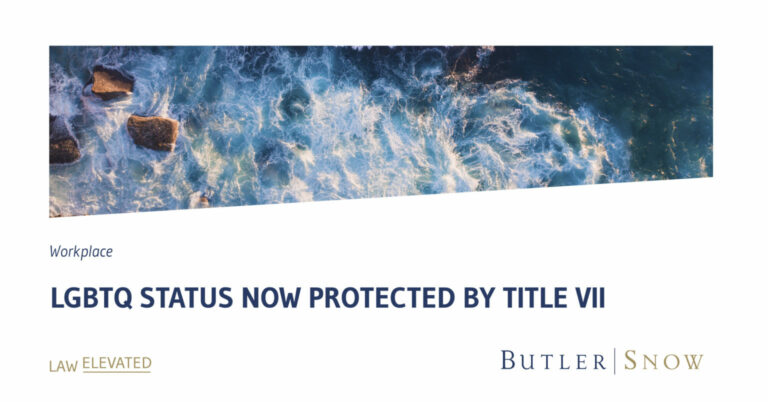Employers must now treat an individual’s LGBTQ status no differently than those other criteria protected by Title VII of the Civil Rights Act of 1964. In a landmark civil rights decision issued on June 15, 2020, the United States Supreme Court determined that LGBTQ status is protected within the employment context by Title VII.
In a surprising 6-3 decision, the Supreme Court concluded that it is impossible to discriminate against a person for being homosexual or transgender without discriminating against that individual based on sex. Justice Gorsuch delivered the Court’s opinion in which fellow Justices Roberts, Ginsburg, Breyer, Sotomayor and Kagan joined. Justice Alito filed a dissenting opinion in which Justice Thomas joined, and Justice Kavanaugh filed his own dissenting opinion.
The Supreme Court’s opinion addressed three cases arising out of the Second, Sixth and Eleventh Circuits which were consolidated for hearing. Gerald Bostock, a long term local governmental employee in Georgia was fired for conduct “unbecoming” shortly after he began participating in a gay softball league. Donald Zarda was fired by his private employer days after he mentioned being gay. Aimee Stephens, who presented as a male at the time she was hired by her private employer was fired after she informed it that she planned to “live and work full-time as a woman.”
Claims were filed on behalf of Bostock, Zarda and Stephens for sex based discrimination in violation of Title VII. The Eleventh Circuit held that Title VII does not prohibit employers from firing employees for being gay and that Mr. Bosick’s lawsuit could be dismissed. The Second and Sixth Circuits, however, allowed the claims of Mr. Zarda and Ms. Stephens, respectively, to proceed. The Supreme Court accepted certiorari to resolve this conflict.
The Supreme Court recognized that the only statutorily protected characteristic at issue was “sex” and that was the primary term in Title VII whose meaning the parties disputed. However, the Court stated that the question “isn’t just what ‘sex’ meant, but what Title VII says about it” recognizing that homosexuality and transgender status are “distinct concepts” from sex. It viewed Title VII’s prohibition as a “broad rule” which sweeps in situations not expressly anticipated by Congress when it enacted Title VII noting earlier types of discrimination conceptually different from sex discrimination. Examples listed by the Court included sexual harassment and “motherhood discrimination.”
The Court did not view its actions as legislating and usurping the role of Congress in contrast to the perspective of the three dissenting justices.[1] Rather the Court stated that “our role is limited to applying the law’s demands as faithfully as we can in the cases that come before us” and “the same humility that requires us to refrain from adding to statutes requires us to refrain from diminishing them.” The Supreme Court concluded that it was not free to “overlook plain statutory commands on the strength of nothing more than suppositions about intentions or guesswork about expectations.”
In Title VII, Congress adopted broad language making it illegal for an employer to rely on an employee’s sex when deciding to fire that employee. The Supreme Court concluded that “[w]e do not hesitate to recognize today a necessary consequence of that legislative choice: An employer who fires an individual merely for being gay or transgender defies the law.”
The Supreme Court left open the issue of how doctrines such as those protecting religious liberty interact with Title VII noting that the Religious Freedom Restoration Act of 1993 “might supersede Title VII’s commands in appropriate cases.” This would seem to include the viability of a defense that compliance with Title VII could require certain employers to violate their religious convictions.
For most employers, the Supreme Court’s decision will likely have little substantive impact as perspectives regarding LGBTQ issues have progressed markedly. However, to the extent that an adverse employment action is considered regarding an LGBTQ employee, the Supreme Court’s decision will necessitate yet another consideration in the process of reviewing the proposed action.
[1] Justice Kavanaugh: “But we are judges, not Members of Congress. And in Alexander Hamilton’s words, federal judges exercise ‘neither Force nor Will, but merely judgment.’ The Federalist No. 78, p. 523 (J. Cooke ed. 1961). Under the Constitution’s separation of powers, our role as judges is to interpret and follow the law as written, regardless of whether we like the result. Cf. Texas v. Johnson, 491 U. S. 397, 420–421 (1989) (Kennedy, J., concurring). Our role is not to make or amend the law.” Justice Alito: “There is only one word for what the Court has done today: legislation. The document that the Court releases is in the form of a judicial opinion interpreting a statute, but that is deceptive.”
